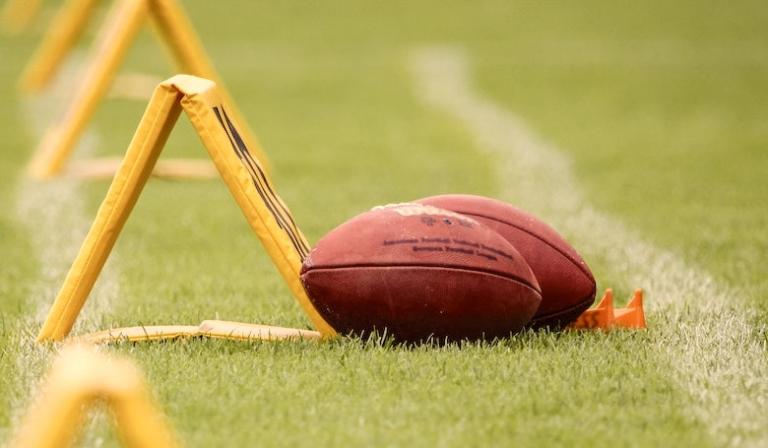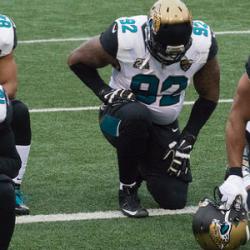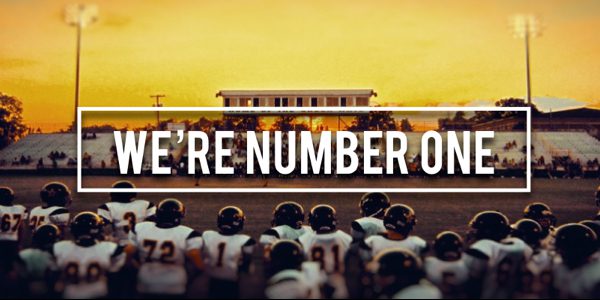
Football is in my blood. My dad was a high-school football coach. My childhood hero was Terry Bradshaw. Not to brag, but I was an elementary school flag football prodigy (I peaked athletically in the 6th grade). As a lifelong fan of Kansas State and Chiefs football, I can’t remember a time when I didn’t sincerely love the game. Yet, I’m always a bit troubled by how much I love football, and by the fact that football shapes us in ways we don’t often think about or understand, especially with regard to nationalism. Is football dangerous for the fans?
The Pros and Cons of Football Fandom
From Friday night lights, to college bowl games, to the NFL playoffs, American football watching is a significant cultural touchstone. Besides the pure entertainment value—and let’s be honest, football is hands down the best sport to watch on television—football fandom also offers people a meaningful form of public belonging and interpersonal connection. I’m constantly texting with my friends, my dad, and my sons about football and other sports. It’s part of how we stay connected and spend time together. Studies have shown that fandom correlates to overall happiness in life and even enhanced critical thinking.
Yet being a fan of American Football does present some obvious ethical concerns. The NFL is an incredibly violent sport, on and off the field. The league’s history on things like racism and domestic violence is not good. Plus the longterm health impact of the sport is troubling. One famous Harvard study comparing NFL and MLB players found that MLB players live to be 66.7 years old on average, compared to 59.6 for NFL players, and 73.7 for the general public. The death rate from heart disease is 2.4 times higher for NFL players, and three times higher for brain disease. Most of us will live close to fifteen years longer than our favorite NFL players, as three out of four will die before reaching the age of 70.
Is Football Shaping Us?
All sport is inherently religious. When the ancient Greeks held their Olympic games the religious elements—including animal sacrifices and cultic prostitution—took almost as much time as the games themselves. The emphasis on worship was so prominent that when Emperor Theodosius I forbade pagan worship within the Roman Empire, the ban extended to the Olympic games.
I’ve written elsewhere that sport in any society functions as a kind of public liturgy; a way of enacting and reinforcing the values of a society. Just watch the pre-game ceremony at any college or pro football stadium. Songs will be sung. Loyalties will be pledged. Allegiance will be sworn to the flag. Reverence for team, university, and country will be on display. Players will thank God or Jesus on camera, and will routinely kneel to pray in pregame, although kneeling during the national anthem (a war hymn) to protest systemic racism stirred a full-blown national controversy.
Football fandom isn’t benign. It’s doing something to us. Football is a kind of public liturgy. As we participate in these liturgies, the game shapes our imagination—largely without our awareness of what is even happening—determining the values to which we will aspire.
The upside of football is the way important values are reinforced by the game—strength, toughness, courage, excellence, teamwork, and determination. The downside involves differing levels of a troubling list of vices — aggression, anger, ego, injury, and violence. As those vices are enacted and cheered week after week on the field, they are woven into the character of society. In a liturgical sense, football forms the kind of people who scream at their televisions, savage the refs, cheer the violence, and celebrate aggression in all its forms, while turning a blind eye toward things like racism and domestic violence in players who can help our team win.
Is Football Dangerous to Christianity
Many of the darker values reinforced by the weekly liturgies of football exist in direct opposition to essential Christian virtues. With regard to violence the conflict is obvious. American football is simulated war, while Christianity is a religion of peacemaking and enemy love. What may not be so obvious, however, is football’s inherent connection to nationalism and empire.
In most respects the American superpower is not that different from ancient Rome, Babylon, or Egypt (Walter Brueggemann often says, if you’ve seen one empire, you’ve seen them all). And while American sports may be seen as entertainment to the casual observer, they function more like liturgies that proclaim and enact powerful cultural narratives of the US empire. A sport like football embodies our common life in microcosm, teaching us whom to celebrate, whom to despise, and the ideals to which we should all aspire.
In her book The Real Americans, Sally Jenkins notes that the game we know as American football was born just after the Civil War. With the ground won and the Indians subjugated, how would the young men from Harvard and Yale prove their manhood? Amid growing concerns that Victorian men were “becoming soft and overcivilized, with nothing left to conquer and too much time spent in parlors,” football came to the rescue: “The rising popularity of football had closely followed the ebbing of the frontier war. It was as though America, at a loss for what to do with itself once the wilderness was subdued, had hit on football as an answer.”
Almost instinctively, Jenkins says, the young men at Harvard and Yale constructed a game that had at its heart two main goals: to prove one’s strength and to take possession of land. Football began as a projection of manifest destiny—a simulated war, two teams scrapping over the same piece of real estate, trying to get their hands on the same ball, and time is always running out.
All empires rely on violence, and all of them justify their violence by telling a story of dangerous enemies and frightening scarcity. Life is a game of musical chairs, and you can’t be caught without a seat when the music stops, hence the guns and bombs. Football is the liturgy of Empire and nationalism that weaves together patriotism and violence. Football enacts and sanctifies the violence of empire and American exceptionalism, portraying both as necessary and unavoidable.
The problem for Christians is that Jesus asked his followers to repent (metanoia) of their zealous nationalism and allegiance to empire. Jesus called his disciples to give their sole allegiance to the kingdom of God—which he characterized as a kingdom of peace and love, not war and violence.
Football’s unparalleled success has produced an American imagination that sees the world as a football field. Foreign enemies are opposing teams who want to invade our territory and dominate us. Team members can prove their courage and loyalty by defending their goal, taking possession of the ball, invading enemy territory, and winning on the field of battle. Forget the box of chocolates, Forrest, life is like a game of football, and Americans play to win.
Football’s inherent reinforcement of American exceptionalism helps make sense of why the military and the NFL have formed such a strong partnership, and why Colin Kaepernick was seen as such a threat. His protests poked holes in the illusion that this nation stands above all other nations as more powerful, virtuous, righteous, and more justified in our actions, even our most violent ones.
Should I Stop Watching Football?
So, should Christians stop Watching Football? Maybe, I don’t know. I think the violence should make us uneasy. I think football should definitely distance itself from nationalism, and try much, much harder to value the humans at the center of the sport, over and above the profit and the power. But the truth is, I will never bring myself to give up the game.
What I do instead is work hard at the counter-liturgies and practices that promise to shape my character in ways that are incompatible with violence and all its friends. If the darker values are reinforced by the weekly liturgies of football, the least I can do is to invest myself in the liturgies and practices that reinforce Christian virtue.
So, I protect liturgies of weekly worship and daily prayer, and the practices of sabbath keeping, peacemaking, and enemy love. I foster them as an intentional counter-weight to the liturgies of football, a way to keep football’s darker values from taking root in my life. I’m not giving up the sport anytime soon, maybe that’s wrong. Nevertheless, I will cultivate the virtues that leave me troubled about my over-allegiance to the game—except for about four hours on Super Bowl Sunday.
Go Chiefs.

















